Tue 24 Jun 2008
Movie Review – THE LEAGUE OF GENTLEMEN (1960).
Posted by Steve under Crime Films , Reviews[8] Comments
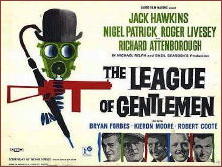 THE LEAGUE OF GENTLEMEN. Allied Film Makers / J. Arthur Rank. 1960. Jack Hawkins, Nigel Patrick, Roger Livesey, Richard Attenborough, Bryan Forbes, Kieron Moore, Terence Alexander, Norman Bird, with Robert Coote, Nanette Newman & Oliver Reed (the latter uncredited). Screenplay: Brian Forbes; based on the novel of the same name by John Boland. Director: Basil Dearden.
THE LEAGUE OF GENTLEMEN. Allied Film Makers / J. Arthur Rank. 1960. Jack Hawkins, Nigel Patrick, Roger Livesey, Richard Attenborough, Bryan Forbes, Kieron Moore, Terence Alexander, Norman Bird, with Robert Coote, Nanette Newman & Oliver Reed (the latter uncredited). Screenplay: Brian Forbes; based on the novel of the same name by John Boland. Director: Basil Dearden.
When this movie was first released in England, it proved to be one of the most popular films of the year. It’s been released there recently as a Special Edition DVD, a long detailed synopsis is available on Wikipedia and an equally in-depth analysis of the film, including its sociological significance re Britain and that country’s post-war malaise, can also be found online.
I’ve also found a two-and-a-half minute trailer on YouTube, which you can go watch if you like, but of course I’ll have something more to say when you come back.
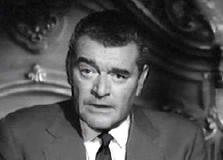
“Heist” films were common in the US in the 1950s — and maybe even before — that is to say, a crime film in which a gang of crooks get together and plan out a robbery in detailed form, sometimes getting away with it and more often not. But apparently this is one of the first British films in the genre, with Jack Hawkins, as Lt.-Col. J. G. Norman Hyde, the ex-military officer in charge.
The others in his squadron of recruits are all down-on-their luck former army officers as well, having been forced out of the service for various wrong-doings and/or squeaking by on the just over the wrong side of the law since entering civilian life. (This aspect of the film gives rise to commentary about post-war Britain and what to do with men like these at variously loose ends with no wars any longer to fight.)
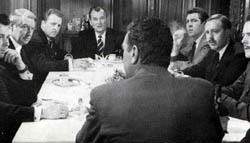
The resulting caper, while entertaining enough, is top-heavy on the front end. There is too much recruitment — with brief glimpses into the players’ current lives, just enough to establish their character (or lack thereof) — and too much preparation for the attack on the bank itself, an act that takes at most only ten minutes in screen time. But “attack” is precisely the right word. These men are fighting back against the establishment — mostly metaphorically speaking, that is, as their eyes are largely on the reward of over a million pounds each.
Here’s another short clip from YouTube, soon after Major Race (Nigel Patrick) has ingratiated his way into becoming Hyde’s second-in-command (with some homosexual implications freely flying, if you’re looking for such things, and I’m not about to go any further than what you see on the screen yourself).
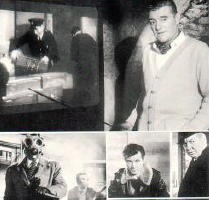
Note that Brian Forbes (who later wrote and directed Seance on a Wet Afternoon, for which he won an MWA Edgar Award in 1965 for Best Foreign Film Screenplay) not only wrote the film but starred in it as well. His wife Nanette Newman (mentioned here once before for his performance in The Wrong Box, produced and directed by Forbes) has a very small role at the beginning of the film, with next to no clothes on (in a bathtub full of suds, I’m sorry to add).
I wish I could say that I was more involved in the film more than I was, but I found the Gentlemen far too seedy, too dishonest, and too corrupt (not all of them and all in different ways) for me to root for them. Waiting and watching for clues as to how their downfall would occur (not if) was, I admit it, a large part of the attraction for me.
The comedy involved — you will find this movie described by some sources as a comedy thriller — is that of the low-key sort of nudge-nudge sort of way that the British so do well, although I wonder if in a crowded theater, several instances of contagious laughter could have broken out, especially back in 1960, when seven men against the establishment was — historians, help me out here — a revolutionary idea still in the making.
POSTSCRIPT. I see that I have failed to say anything about the book this movie was based on. It was published in 1958 by T.V. Boardman in the UK, with a paperback (I think) from Pan. In the US it was published only by Beacon in 1961, a company otherwise known for its long line of sleazy fiction.
In any edition, though, it’s scarce, and so far I’ve failed to come up for a cover image to show you. The second of the non-YouTube links above states that Boland rewrote the ending of the book after the film came out, thus allowing for two more books in the series: The Gentlemen Reform (Boardman, 1961) and The Gentlemen at Large (Boardman, 1962).
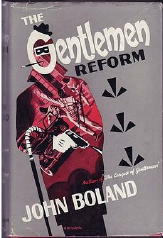
[UPDATE] 06-26-08. Bruce Grossman just emailed me to say that he found a copy of the US paperback edition up for sale on eBay. I’d buy it, but sellers who want money orders and not Paypal just don’t get my money. But here’s the cover. I’ll find another copy one of these days:
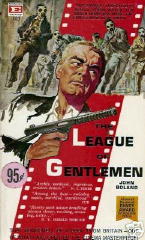
Note that this is obviously a movie tie-in edition, with Jack Hawkins’ easily recognizable face front and center.
June 25th, 2008 at 5:53 am
There were some Ealing comedies before this, that could be labeled as heist or caper films (but, sorry, can’t recall the titles). And most certainly the Brits had their own film noirs, but I don’t know if they did any caper noirs. Would have to check further.
June 25th, 2008 at 10:48 am
You’re right, Juri. Both The Lavender Hill Mob (1951) and The Ladykillers (1955) were done by Ealing Studios, and both came before The League of Gentlemen.
I think the difference between the Ealing films and this one is that both of the first two were primarily comedies, and League was only incidentally so. (I may have overemphasized its comic content.)
It’s also the military precision in setting up the heist that marks League as being something different from the earlier two.
So Juri, thanks for your input. I’m going to have to revise my thoughts. As far as the idea of “lone individuals against the establishment” is concerned, The League of Gentlemen wasn’t really one of the first.
What struck a chord with the British populace may have been the movie’s dealing directly with problem of what to do with hordes of former military personnel in the face of a dwindling empire.
I’m on the wrong side of the Atlantic to try to say anything more. Other comments are welcome!
— Steve
June 25th, 2008 at 9:07 pm
I recently watched this thanks to certain internet ingenuity* excellent caper film
*torrents
June 25th, 2008 at 9:24 pm
You’re more ingenious than I, Bruce. I learned how to operate my video tape recorder when they first came out, but any technology newer than that has pretty much been a mystery to me. The League of Gentlemen was on the Independent Film Channel some time ago, and that’s where my copy came from.
— Steve
June 27th, 2008 at 12:04 pm
[…] Posted by Steve under Crime Films Tise left the following as a comment to my previous review on The League of Gentlemen. The detailed information on the history of post-war British caper films […]
July 13th, 2008 at 8:55 pm
[…] line: A mousy accountant named Sam Carter (played by Nigel Patrick, last seen here in The League of Gentlemen) waits 15 years before finally stealing a near priceless diamond from a Manhattan jewelry dealer, […]
July 10th, 2009 at 9:39 pm
[…] This clever spy spoof mixes humor with action and an unusually intelligent and quip-filled script handled by an expert cast who know their way around a dry line or a raised eyebrow. The scenery is handsome, the direction crisp, and the plot keeps twisting right up to the final scene. Robertson was born to play this sort of whimsical hero and Hawkins plays Drexel with some of the same style he brought to his role in The League of Gentleman, reviewed earlier by Steve here. […]
September 15th, 2011 at 10:02 am
This movie keeps on turning up on Ch 4 progs, so we know it off by heart.
There were 3 old boys from “A Matter of Life and Death” – Attenborough, Livesey & Coote. 3 years later, Hawkins and Nigel Greene (u/c lorry driver) were in “Zulu”.
The inferrable homosexual-attraction bit between Race and Hyde is avoided by showing the former flopping over his mistress in an early scene and talking about love. Apparently, the brotherly love in military cameraderie just stops short of gayness.
Bryan Forbes seemed to get his second wife into most of his later films – and she was wearing something under the suds.